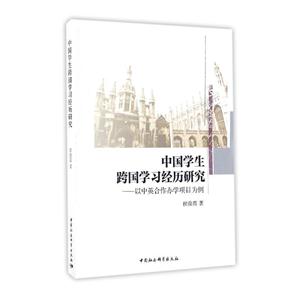中國(guó)學(xué)生跨國(guó)學(xué)習(xí)經(jīng)歷研究-以中英合作辦學(xué)項(xiàng)目為例 版權(quán)信息
- ISBN:9787516182819
- 條形碼:9787516182819 ; 978-7-5161-8281-9
- 裝幀:暫無(wú)
- 冊(cè)數(shù):暫無(wú)
- 重量:暫無(wú)
- 所屬分類:>>
中國(guó)學(xué)生跨國(guó)學(xué)習(xí)經(jīng)歷研究-以中英合作辦學(xué)項(xiàng)目為例 本書特色
中外合作辦學(xué)自上個(gè)世紀(jì)90年代以來(lái)逐漸成為中 國(guó)高等教育的重要組成部分,是中國(guó)高校國(guó)際化的指 標(biāo)之一,也是引進(jìn)國(guó)際優(yōu)質(zhì)教育資源的重要途徑之一 。《中國(guó)學(xué)生跨國(guó)學(xué)習(xí)經(jīng)歷研究--以中英合作辦學(xué)項(xiàng) 目為例》的作者侯俊霞采用民族志研究方法,對(duì)50名 中英合作辦學(xué)項(xiàng)目學(xué)生中英兩校學(xué)習(xí)經(jīng)歷進(jìn)行歷時(shí)跟 蹤研究。通過(guò)參與式觀察、深度訪談和政策分析等方 法搜集數(shù)據(jù)。研究發(fā)現(xiàn)受留學(xué)動(dòng)機(jī)、行前準(zhǔn)備、語(yǔ)言 能力和自主學(xué)習(xí)能力等因素的影響,這些學(xué)生中英兩 校學(xué)習(xí)經(jīng)歷和結(jié)果千差萬(wàn)別。本文在此基礎(chǔ)上概括了 三種典型的應(yīng)對(duì)策略類型,并進(jìn)一步深入分析了同一 類型內(nèi)部的細(xì)微差別。同時(shí),由于項(xiàng)目的特殊性,他 們的到來(lái)在英國(guó)大學(xué)形成了許多中國(guó)人占主導(dǎo)的課堂 ,改變了原有課堂文化,出現(xiàn)了“我們”和“他們” 分割現(xiàn)象,在一定程度上影響了兩國(guó)學(xué)生的學(xué)習(xí)經(jīng)歷 ,這也是合作院校在培養(yǎng)學(xué)生跨文化能力方面必須面 對(duì)的挑戰(zhàn)。
中國(guó)學(xué)生跨國(guó)學(xué)習(xí)經(jīng)歷研究-以中英合作辦學(xué)項(xiàng)目為例 內(nèi)容簡(jiǎn)介
中外合作辦學(xué)自上個(gè)世紀(jì)90年代以來(lái)逐漸成為中國(guó)高等教育的重要組成部分,是中國(guó)高校國(guó)際化的指標(biāo)之一,也是引進(jìn)國(guó)際優(yōu)質(zhì)教育資源的重要途徑之一。《中國(guó)學(xué)生跨國(guó)學(xué)習(xí)經(jīng)歷研究以中英合作辦學(xué)項(xiàng)目為例》的作者侯俊霞采用民族志研究方法,對(duì)50名中英合作辦學(xué)項(xiàng)目學(xué)生中英兩校學(xué)習(xí)經(jīng)歷進(jìn)行歷時(shí)跟蹤研究。通過(guò)參與式觀察、深度訪談和政策分析等方法搜集數(shù)據(jù)。研究發(fā)現(xiàn)受留學(xué)動(dòng)機(jī)、行前準(zhǔn)備、語(yǔ)言能力和自主學(xué)習(xí)能力等因素的影響,這些學(xué)生中英兩校學(xué)習(xí)經(jīng)歷和結(jié)果千差萬(wàn)別。本文在此基礎(chǔ)上概括了三種典型的應(yīng)對(duì)策略類型,并進(jìn)一步深入分析了同一類型內(nèi)部的細(xì)微差別。同時(shí),由于項(xiàng)目的特殊性,他們的到來(lái)在英國(guó)大學(xué)形成了許多中國(guó)人占主導(dǎo)的課堂,改變了原有課堂文化,出現(xiàn)了“我們”和“他們”分割現(xiàn)象,在一定程度上影響了兩國(guó)學(xué)生的學(xué)習(xí)經(jīng)歷,這也是合作院校在培養(yǎng)學(xué)生跨文化能力方面必須面對(duì)的挑戰(zhàn)。
中國(guó)學(xué)生跨國(guó)學(xué)習(xí)經(jīng)歷研究-以中英合作辦學(xué)項(xiàng)目為例 目錄
Chapter 1 Introduction1.1 Research Background1.2 Research Overview1.3 The Organisation of the Book
Chapter 2 Chinese-Foreign Cooperation in Running SchoolsSetting the Scene2.1 Introduction2.2 Globalisation, Internationalisation & TransnationalHigher Education2.3 Chinese-British Cooperation in TransnationalHigher Education2.3.l The UK Story2.3.2 The Chinese Story2.4 Features of Transnational Higher Education inChina2.4.1 The First Feature2.4.2 The Second Feature2.4.3 The Third Feature2.5 Discussions2.6 Conclusions
Chapter 3 Intercultural Transition3.1 Introduction3.2 Existing Models: Towards Happy-ending?3.2.1 Cultural Shock3.2.2 Stress-Adaptation-Growth Model3.2.3 Developmental Models3.3 National Cultures Perspective: a Suitable Way inUnderstanding Individuals?3.3.1 National Cultural Theory and the Danger ofStereotyping Individuals3.3.2 Culture of Learning Theory and the Tendency toStereotype Chinese Learners3.4 A Microscopic Perspective: Focusing on IndividualFactors3.4.1 Motivation for Studying Abroad3.4.2 Pre-departure Preparation3.4.3 Language Competency3.4.4 Personal Factors Related to Autonomy3.5 A Contextual Perspective: Focusing on SituationalFactors3.5.1 Support from Conational, Host National andOther National Groups3.5.2 Formative Assessment and Transition in HigherEducation3.6 Intercultural Transition Group Oriented3.6.1 Intergroup Contact3.6.2 Ways to Reduce Intergroup Bias3.6.3 The Intercultural Contact Experiences of InternationalStudents and Home Students3.7 Conclusions
Chapter 4 Methodology4.1 Introduction4.2 My Philosophical Position4.3 My Choice of Research Strategy4.4 My Choice of Methodology4.5 My Way of Collecting Data ...4.5.1 Locating the Natural Setting4.5.2 Negotiating to Get the Permission into the Field4.5.3 Getting into the Field4.5.4 Participant Observation4.5.5 In-depth Interviews4.5.6 Document Analysis4.5.7 Leaving the Field4.6 My Way of Analysing the Data4.7 Rigour and Trustworthiness of the Research4.8 My Concerns of Ethical Issues4.9 Reflexivity4.9.1 My Personal Experience on the Interpretation of theData4.9.2 My Participation in the Field on My Participants'Transition Experience4.9.3 Rethinking the Research Methodology4.10 Conclusions
Chapter 5 Individual Transition5.1 Introduction5.2 Motivation for Studying Abroad5.2.1 It is My Decision Supported by My Parents5.2.2 Decision Largely out of Respect for Parents'Opinion5.2.3 Parents' Decision Neglecting Students'Interest5.3 Pre-departure Preparation5.3.1 Preparation from the Programme and Schools5.3.2 Attitudes Towards Pre-departure Preparation5.4 Interaction with the New Learning Environment5.4.1 New Features in the New Learning Environment5.4.2 Three Patterns of Students' Interaction with theNew Learning Environment5.5 Transition Outcome5.6 Conclusions
Chapter 6 Studying Abroad as a Group6.1 Introduction6.2 Formation of Two Groups: Us and Them6.2.1 Students in Sino-British Class: a Close Group onChinese Campus6.2.2 Chinese Students' : a Closed Group in the Classon British Campus6.2.3 Intergroup Bias6.3 Current Practices of Intergroup Contact6.4 Conclusions
Chapter 7 Discussion and Conclusions7.1 Introduction7.2 Individual Transition Experience: Different Journeysand Different Outcomes7.3 Studying Abroad as a Group: Us & ThemUnavoidable?7.4 Transition and the Impact on the Teaching andLearning Context at Two Campuses7.5 Conclusions
References
展開全部
中國(guó)學(xué)生跨國(guó)學(xué)習(xí)經(jīng)歷研究-以中英合作辦學(xué)項(xiàng)目為例 作者簡(jiǎn)介
侯俊霞,河南安陽(yáng)人,教育學(xué)博士。1998年畢業(yè)于國(guó)防科技大學(xué)科技英語(yǔ)專業(yè),獲文學(xué)學(xué)士。2006年9月至2012年7月留學(xué)英國(guó)。2007年獲得英國(guó)諾森比亞大學(xué)教育學(xué)文學(xué)碩士,學(xué)位等級(jí)為優(yōu)等。此后獲得學(xué)校優(yōu)質(zhì)教學(xué)促進(jìn)中心(CETL)博士全額獎(jiǎng)學(xué)金資助。2012年7月獲得教育學(xué)博士學(xué)位。現(xiàn)任國(guó)防科技大學(xué)人文與社會(huì)科學(xué)學(xué)院副教授,主要從事外語(yǔ)教育、跨文化交際和質(zhì)性研究方法研究。















